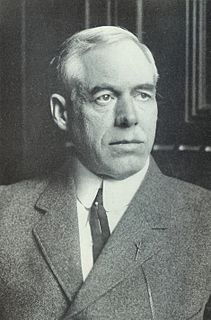A Quote by Robert Grudin
The mind which can totally and inanely forget its work and obligations is often also the mind which can, at the proper time, give them the fullest attention.
Related Quotes
It isn't a hunch but the subconscious mind, which is the creative mind, at work. That is the mind which makes artists do things without their knowing how they came to do them. Perhaps with me it was the cumulative effect of a lot of little things individually insignificant but collectively powerful.
Instead of 'watching the thinker,' you can also create a gap in the mind stream simply by directing the focus of your attention into the Now. Just become intensely conscious of the present moment. This is a deeply satisfying thing to do. In this way, you draw consciousness away from mind activity and create a gap of no-mind in which you are highly alert and aware but not thinking. This is the essence of meditation.
Insanity is often the logic of an accurate mind overtasked. Good mental machinery ought to break its own wheels and levers, if anything is thrust among them suddenly which tends to stop them or reverse their motion. A weak mind does not accumulate force enough to hurt itself; stupidity often saves a man from going mad.
You can call it tathata, suchness. 'Suchness' is a Buddhist way of expressing that there is something in you which always remains in its intrinsic nature, never changing. It always remains in its selfsame essence, eternally so. That is your real nature. That which changes is not you, that is mind. That which does not change in you is buddha-mind. You can call it no-mind, you can call it samadhi, satori. It depends upon you; you can give it whatsoever name you want. You can call it christ-consciousness.
I put my children first, but I always keep my obligations or my commitments. You really have to do some internal work to know yourself, know what you're capable of. See how many meetings you can take a day or how much work you can get through in a day. Give it lots of proper time and respect, but also give yourself the respect of having your downtime, whether that means yoga, pilates, a meditation class, or a cooking class.
In trouble we are prone to forget all that we have heard and read that makes for our comfort. Now what is the reason that a man comes to think of that which otherwise he should never have called to mind? The Holy Spirit brings it to his remembrance; He is a Comforter, bringing to mind useful things at such times when we have most need of them.
These tenses-past, present and future-are not the tenses of time; they are tenses of the mind. That which is no longer before the mind becomes the past. That which is before the mind is the present. And that which is going to be before the mind is the future. Past is that which is no longer before you. Future is that which is not yet before you. And present is that which is before you and is slipping out of your sight. Soon it will be past.
The inlet of a man's mind is what he learns; the outlet is what he accomplishes. If his mind is not fed by a continued supply of new ideas which he puts to work with purpose, and if there is no outlet in action, his mind becomes stagnant. Such a mind is a danger to the individual who owns it and is useless to the community.
By means of meditation we can teach our minds to be calm and balanced; within this calmness is a richness and a potential, an inner knowledge which can render our lives boundlessly satisfying and meaningful. While the mind may be what traps us in unhealthy patterns of stress and imbalance, it is also the mind which can free us. Through meditation, we can tap the healing qualities of mind.
Remember the word bodhichitta, because Atisha says the whole effort of religion, the whole science of religion, is nothing but an endeavor to create bodhichitta, buddha-consciousness: a mind which functions as a no-mind, a mind which dreams no more, thinks no more, a mind which is just awareness, pure awareness.



































